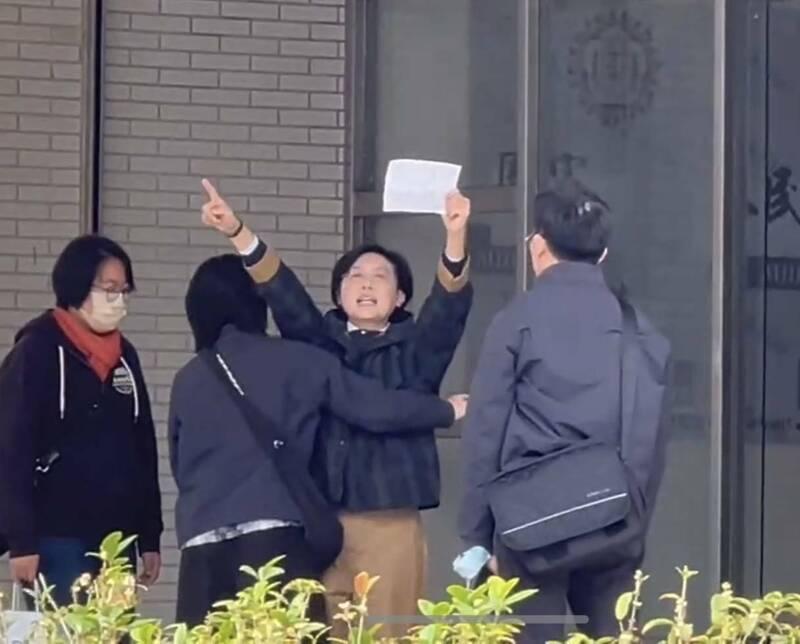Democratic Progressive Party (DPP) Legislator Lin Tai-hua (林岱樺) from Kaohsiung is under investigation after being suspected of fraudulently claiming expenses to pay her assistants.
Prosecutors and investigators this morning searched her office at the Legislative Yuan in Taipei and her constituency service office in Kaohsiung, before taking Lin in for questioning at the southern mobile workstation of the Investigation Bureau under the Ministry of Justice in Kaohsiung’s Siaogang District (小港).
Upon being apprehended, Lin suddenly took out a white sheet of paper and repeatedly shouted to the media, “political interference in the Judicial Yuan, the Judicial Yuan is interfering in the primaries,” despite investigators' attempts to stop her.

Photo courtesy of a reader
Lin has, up until now, been on top of public polls to win the DPP primary to select the party’s candidate for the Kaohsiung mayoral election coming up next year.
Earlier today, Lin’s constituency service office released a statement saying that as legislator, Lin had not broken the law and all expenses claimed were legal and justified, and though they would cooperate with the Judicial Yuan’s investigation, she would be found innocent.
The Kaohsiung District Prosecutors Office declined to comment on the case.
The Legislative Yuan issued a news release saying that this morning’s search of Lin’s office complied with regulations and they were notified in advance by prosecutors, after which they sent personnel to accompany investigators, though they could not comment further on the details of an ongoing investigation.
Investigators completed the search at 11.10am, leaving the Legislative Yuan with four white boxes.
Lin, the daughter of the former mayor of Fengshan City (鳳山市) Lin San-lang (林三郎), was first elected to the Legislative Yuan in 2001 as a representative of Fengshan District (鳳山) in Kaohsiung City.
In 2009, she was nominated to take office as mayor of Kaohsiung County, but in the same year, Kaohsiung County merged with Kaohsiung City and the position was retracted.
Lin has been named as one of five candidates to run in the DPP primary to select the party’s candidate for the Kaohsiung mayoral election coming up next year, and has been pegged as the frontrunner.
Lin has been described as a “lone wolf legislator,” due to her strong Buddhist beliefs and religious affiliations, however, she has been involved in past controversies, including opposition to same-sex marriage.
There have been reports that three of her opponents, all legislators from DPP’s New Tide Faction, may join forces and nominate a single candidate to face off against Lin, though after today’s investigation, her participation in the primary remains to be seen.
Kaohsiung Mayor Chen Chi-mai (陳其邁) said he respects the judiciary and hopes that investigators would find out the truth.
Chiou Jiunn-yann (邱駿彥), head of the DPP's anti-corruption committee, said a meeting is to be held on Wednesday next week to discuss the case involving the party’s Taipei City Councilor Chen E-jun (陳怡君) who allegedly claimed NT$3 million (US$91,334) in fraudulent assistant fees.
Chen is to attend a detention hearing at 3pm today after the High Court revoked the Shilin District Court’s ruling to release Chen on bail of NT$1 million which was appealed by prosecutors.
Whether the meeting would also discuss Lin’s case would depend on whether she would be detained and how much evidence prosecutors had, said Chiou.
Additional reporting by CNA.

Taiwan is stepping up plans to create self-sufficient supply chains for combat drones and increase foreign orders from the US to counter China’s numerical superiority, a defense official said on Saturday. Commenting on condition of anonymity, the official said the nation’s armed forces are in agreement with US Admiral Samuel Paparo’s assessment that Taiwan’s military must be prepared to turn the nation’s waters into a “hellscape” for the Chinese People’s Liberation Army (PLA). Paparo, the commander of the US Indo-Pacific Command, reiterated the concept during a Congressional hearing in Washington on Wednesday. He first coined the term in a security conference last

Prosecutors today declined to say who was questioned regarding alleged forgery on petitions to recall Democratic Progressive Party (DPP) legislators, after Chinese-language media earlier reported that members of the Chinese Nationalist Party (KMT) Youth League were brought in for questioning. The Ministry of Justice Investigation Bureau confirmed that two people had been questioned, but did not disclose any further information about the ongoing investigation. KMT Youth League members Lee Hsiao-liang (李孝亮) and Liu Szu-yin (劉思吟) — who are leading the effort to recall DPP caucus chief executive Rosalia Wu (吳思瑤) and Legislator Wu Pei-yi (吳沛憶) — both posted on Facebook saying: “I

The Ministry of Economic Affairs has fined Taobao NT$1.2 million (US$36,912) for advertisements that exceed its approved business scope, requiring the Chinese e-commerce platform to make corrections in the first half of this year or its license may be revoked. Lawmakers have called for stricter enforcement of Chinese e-commerce platforms and measures to prevent China from laundering its goods through Taiwan in response to US President Donald Trump’s heavy tariffs on China. The Legislative Yuan’s Finance Committee met today to discuss policies to prevent China from dumping goods in Taiwan, inviting government agencies to report. Democratic Progressive Party Legislator Kuo Kuo-wen (郭國文) said

The Ministry of Economic Affairs has fined Taobao NT$1.2 million (US$36,900) for advertisements that exceeded its approved business scope and ordered the Chinese e-commerce platform to make corrections in the first half of this year or its license would be revoked. Lawmakers have called for stricter supervision of Chinese e-commerce platforms and more stringent measures to prevent China from laundering its goods through Taiwan as US President Donald Trump’s administration cracks down on origin laundering. The legislature’s Finance Committee yesterday met to discuss policies to prevent China from dumping goods in Taiwan, inviting government agencies to report on the matter. Democratic Progressive Party